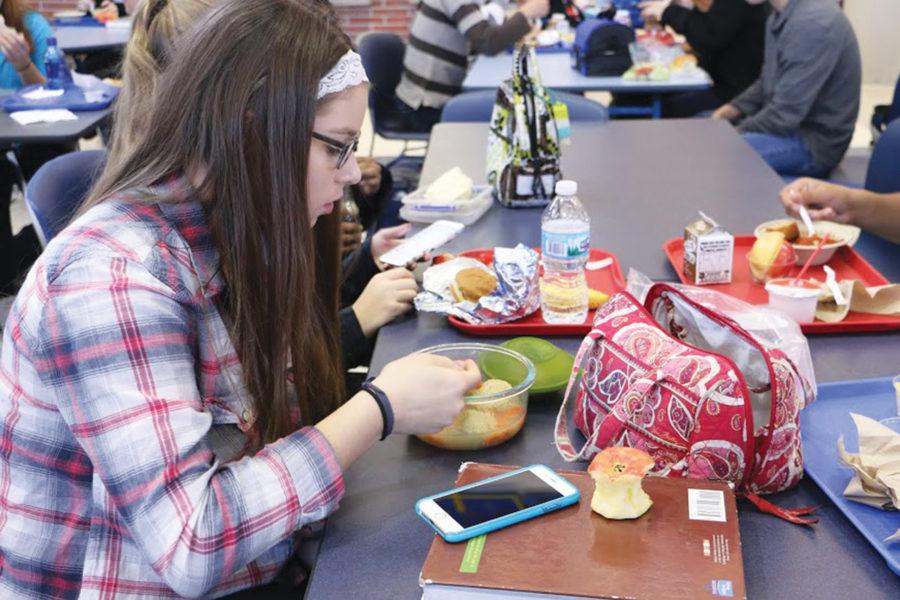During the holidays, many people have their own food traditions whether it results from their ethnicity, religion or just their family. Vivian Halloran, Food Studies Professor at Indiana University, observes that family holiday traditions give multiple generations a chance to share and perform their own unique sense of a collective identity.
 “Holidays add their own repertoire of festive food dishes that are usually not eaten the rest of the year,” Halloran said via email. “Thanksgiving is an odd food-centered holiday in that it is pretty much a patriotic or nationalistic way of performing one’s patriotism in very similar ways to how other families do all across the United States.”
“Holidays add their own repertoire of festive food dishes that are usually not eaten the rest of the year,” Halloran said via email. “Thanksgiving is an odd food-centered holiday in that it is pretty much a patriotic or nationalistic way of performing one’s patriotism in very similar ways to how other families do all across the United States.”
According to Halloran, it is also a great way in which families can celebrate their own food traditions that reflect their ethnic background or religious traditions. She said Thanksgiving and other winter holidays gives people a great way to connect with others of the same ethnicity or those with the same food traditions, because by eating the same foods and continuing to pass the recipes down the generations, there is a sense of continuity and belonging.
“By eating festive foods, people feel connected to nameless others like them, despite living in a diverse society,” Halloran said.
According to the U.S. Embassy, cuisine in different parts of the United States developed independently and were influenced by the nationality of colonists that settled in the area, along with the local ingredients that were available. Because the United States is a nation of immigrants, cooking is very diverse along with its population. American food cannot be objectively defined, because in different regions of the United States, there are different food preferences. Some include New England and Southern states, which are known for seafoods and barbecue, respectively. However, religion, ethnicity and family traditions override the regions when its comes to specific holiday food preferences.
Freshman Hannah Kosc also has many traditional foods due to her family being Jewish. She said that she celebrates holiday feasts like Passover Seder, which have been passed down through the generations. Like Halloran said, the holiday is typically celebrated in much the same way by Jews all over the world, with minor differences.
“The food that we make sometimes is very traditional like matzo ball soup, but sometimes with a modern twist on things just to kind of tie it in with the way that my family practices Judaism,” Kosc said.
Family also plays a role in the different foods she eats. Kosc said her family eats brussel sprouts, just because her grandparents like brussel sprouts.
According to Halloran, preparing and enjoying special foods gives all generations in a family something to share and talk about that strengthens their bond with each other. She said it also presents the prospect of a pleasurable meal at the end, which is a fun way to spend time together.
Halloran originated from Puerto Rico, where she said she learned to cherish many food traditions. However, she doesn’t prepare them for her kids, because the ingredients are hard to come by in the Midwest.
“Because of my food research, however, I’ve picked up some new traditions. My favorite trick is to make leftover Thanksgiving turkey into vindaloo (which is a) a red wine vinegar curry with tomatoes and onions,” Halloran said. “The Portuguese influence is evident in the red wine vinegar, and it probably dates back from when they set up a colony in Goa, India.” She added that her kids love the vindaloo, which is a great way for her to avoid food waste.
Sophomore Sathvik Madduri also celebrates both his own and his family’s food traditions. He said because he is Indian and Hindu, his parents cook certain types of Indian food for holidays.
“We don’t eat turkey, because I’m vegetarian, just (other) traditional foods,” Madduri said.
According to Madduri, the Indian holiday Diwali, which is also known as the Festival of Lights, is celebrated in the month of November by all Indians. He said that during the holiday, his family eats authentic curry, rice, dosa, sambar and other Indian foods.
Kosc said, “I enjoy the traditions. I think it’s a good connection to my past and it’s just a thing that’s fun, because the entire family comes together and it’s just special.”




























![Keep the New Gloves: Fighter Safety Is Non-Negotiable [opinion]](https://hilite.org/wp-content/uploads/2024/12/ufcglovescolumncover-1200x471.png)
















































![Review: “We Live in Time” leaves you wanting more [MUSE]](https://hilite.org/wp-content/uploads/2024/12/IMG_6358.jpg)
![Review: The premise of "Culinary Class Wars" is refreshingly unique and deserving of more attention [MUSE]](https://hilite.org/wp-content/uploads/2024/12/MUSE-class-wars-cover-2.png)
![Introducing: "The Muses Who Stole Christmas," a collection of reviews for you to follow through winter [MUSE]](https://hilite.org/wp-content/uploads/2024/12/winter-muse-4.gif)
![Review: "Meet Me Next Christmas" is a cheesy and predictable watch, but it was worth every minute [MUSE]](https://hilite.org/wp-content/uploads/2024/11/AAAAQVfRG2gwEuLhXTGm3856HuX2MTNs31Ok7fGgIVCoZbyeugVs1F4DZs-DgP0XadTDrnXHlbQo4DerjRXand9H1JKPM06cENmLl2RsINud2DMqIHzpXFS2n4zOkL3dr5m5i0nIVb3Cu3ataT_W2zGeDAJNd_E-1200x884.jpg)
![Review: "Gilmore Girls", the perfect fall show [MUSE]](https://hilite.org/wp-content/uploads/2024/11/gilmore-girls.png)
![Review in Print: Maripaz Villar brings a delightfully unique style to the world of WEBTOON [MUSE]](https://hilite.org/wp-content/uploads/2023/12/maripazcover-1200x960.jpg)
![Review: “The Sword of Kaigen” is a masterpiece [MUSE]](https://hilite.org/wp-content/uploads/2023/11/Screenshot-2023-11-26-201051.png)
![Review: Gateron Oil Kings, great linear switches, okay price [MUSE]](https://hilite.org/wp-content/uploads/2023/11/Screenshot-2023-11-26-200553.png)
![Review: “A Haunting in Venice” is a significant improvement from other Agatha Christie adaptations [MUSE]](https://hilite.org/wp-content/uploads/2023/11/e7ee2938a6d422669771bce6d8088521.jpg)
![Review: A Thanksgiving story from elementary school, still just as interesting [MUSE]](https://hilite.org/wp-content/uploads/2023/11/Screenshot-2023-11-26-195514-987x1200.png)
![Review: "When I Fly Towards You", cute, uplifting youth drama [MUSE]](https://hilite.org/wp-content/uploads/2023/09/When-I-Fly-Towards-You-Chinese-drama.png)
![Postcards from Muse: Hawaii Travel Diary [MUSE]](https://hilite.org/wp-content/uploads/2023/09/My-project-1-1200x1200.jpg)
![Review: "Ladybug & Cat Noir: The Movie," departure from original show [MUSE]](https://hilite.org/wp-content/uploads/2023/09/Ladybug__Cat_Noir_-_The_Movie_poster.jpg)
![Review in Print: "Hidden Love" is the cute, uplifting drama everyone needs [MUSE]](https://hilite.org/wp-content/uploads/2023/09/hiddenlovecover-e1693597208225-1030x1200.png)
![Review in Print: "Heartstopper" is the heartwarming queer romance we all need [MUSE]](https://hilite.org/wp-content/uploads/2023/08/museheartstoppercover-1200x654.png)




